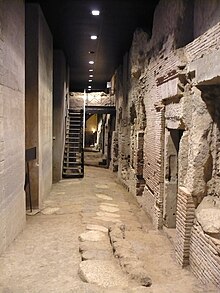| Basilica of San Lorenzo Maggiore Basilica di San Lorenzo Maggiore (in Italian) | |
|---|---|
 Façade of San Lorenzo Maggiore. | |
| Religion | |
| Affiliation | Roman Catholic |
| District | Archdiocese of Naples |
| Ecclesiastical or organizational status | Minor basilica |
| Location | |
| Location | Naples, Campania, Italy |
| Geographic coordinates | 40°51′03″N 14°15′29″E / 40.85093°N 14.25812°E |
| Architecture | |
| Type | Church |


San Lorenzo Maggiore is a church in Naples, Italy. It is located at the precise geographic center of the historic center of the ancient Greek-Roman city, at the intersection of via San Gregorio Armeno and via dei Tribunali. The name "San Lorenzo" may also refer to the new museum now opened on the premises, as well as to the ancient Roman market beneath the church itself, the Macellum of Naples.
The church's origins derive from the presence of the Franciscan order in Naples during the lifetime of St Francis of Assisi, himself. The site of the present church was to compensate the order for the loss of their earlier church on the grounds where Charles I of Anjou decided to build his new fortress, the Maschio Angioino in the late 13th century.
San Lorenzo is both a church and monastery and the new museum takes up the three floors above the courtyard and is given over to the entire history of the area that centers on San Lorenzo, beginning with classical archaeology and progressing to a chart display of historical shipping routes from Naples throughout Magna Grecia and the Roman Empire. The museum provides a detailed account of the local "city hall" that was demolished in order to put up the church in the 13th century and continues up past the Angevin period and into more recent history.
Beneath San Lorenzo, about half of an original Roman market has been excavated. The site has been open since 1992, the result of 25 years of painstaking excavation. The market place is the only large-scale Greek-Roman site excavated in the downtown area.
In this church Boccaccio met his beloved Fiammetta (1338).
The church and monastery now belong to the Conventual branch of the Franciscans.[1]
- ^ General Curia, Presenze OFM Conv - N, accessed 19 October 2022